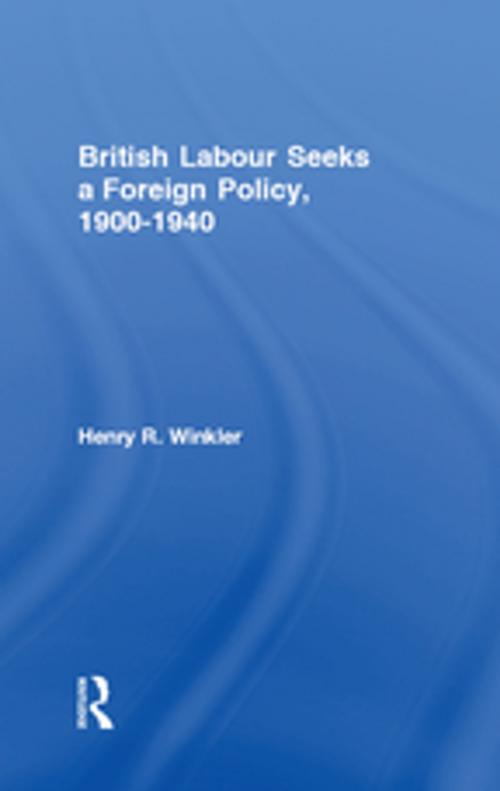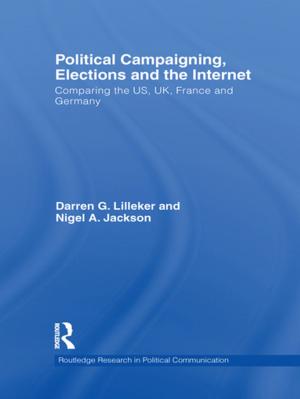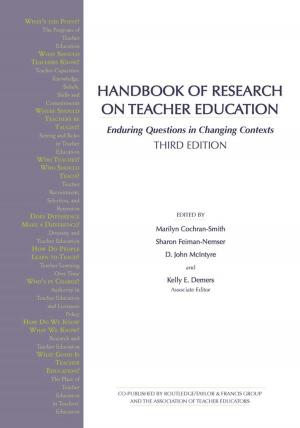British Labour Seeks a Foreign Policy, 1900-1940
Nonfiction, Social & Cultural Studies, Political Science, International, International Relations, History| Author: | ISBN: | 9781351322300 | |
| Publisher: | Taylor and Francis | Publication: | October 24, 2017 |
| Imprint: | Routledge | Language: | English |
| Author: | |
| ISBN: | 9781351322300 |
| Publisher: | Taylor and Francis |
| Publication: | October 24, 2017 |
| Imprint: | Routledge |
| Language: | English |
Since World War II, the British Labour Party has played a central role in dealing with complex international issues. Achieving real power in parliament for the first time, Labour governments have acted responsibly, and are usually in accord with the views of a substantial majority of the British people. Such was not always the case. In British Labour Seeks a Foreign Policy, 1900-1940, Henry R. Winkler synthesizes twenty years' study of the subject to offer the first full-scale treatment of the Labour Party's evolution in foreign affairs.
The Labour Party came into existence at the beginning of the twentieth century to deal with the domestic problems of the working class, and it showed relatively little interest in foreign policy issues. In the aftermath of World War I, however, small groups of moderates made the case against the bitter rejection of the Versailles Treaty by many in the Labour Party and the trade union movement. Most of these argued that the League of Nations could be used to remedy some of the deficiencies of the settlement and that such a League must have the sanction of force if it was to be effective.
During the 1930s, the failures of the League--in the Far East, Abyssinia, Spain, and Central Europe--compelled some of its advocates to conclude that, League or no League, the threat from Nazi Germany mandated support for a program of preparedness and rearmament even under the aegis of a hated National Government. The result, by 1937, was the final formal abandonment of many of the radical illusions of the twenties and thirties, as Labour reluctantly but formally assumed a posture that enabled it to share in the governance of wartime Britain and to take a key role in dealing with the international issues that emerged in the aftermath of the Second World War.
This volume contains valuable lessons on the responsibilities of political parties as well as the pros and cons of specific policies. It is essential reading for understanding Britain's later stands as its leaders tried to adjust to Britain's diminished power in the post-World War II world.
Since World War II, the British Labour Party has played a central role in dealing with complex international issues. Achieving real power in parliament for the first time, Labour governments have acted responsibly, and are usually in accord with the views of a substantial majority of the British people. Such was not always the case. In British Labour Seeks a Foreign Policy, 1900-1940, Henry R. Winkler synthesizes twenty years' study of the subject to offer the first full-scale treatment of the Labour Party's evolution in foreign affairs.
The Labour Party came into existence at the beginning of the twentieth century to deal with the domestic problems of the working class, and it showed relatively little interest in foreign policy issues. In the aftermath of World War I, however, small groups of moderates made the case against the bitter rejection of the Versailles Treaty by many in the Labour Party and the trade union movement. Most of these argued that the League of Nations could be used to remedy some of the deficiencies of the settlement and that such a League must have the sanction of force if it was to be effective.
During the 1930s, the failures of the League--in the Far East, Abyssinia, Spain, and Central Europe--compelled some of its advocates to conclude that, League or no League, the threat from Nazi Germany mandated support for a program of preparedness and rearmament even under the aegis of a hated National Government. The result, by 1937, was the final formal abandonment of many of the radical illusions of the twenties and thirties, as Labour reluctantly but formally assumed a posture that enabled it to share in the governance of wartime Britain and to take a key role in dealing with the international issues that emerged in the aftermath of the Second World War.
This volume contains valuable lessons on the responsibilities of political parties as well as the pros and cons of specific policies. It is essential reading for understanding Britain's later stands as its leaders tried to adjust to Britain's diminished power in the post-World War II world.















